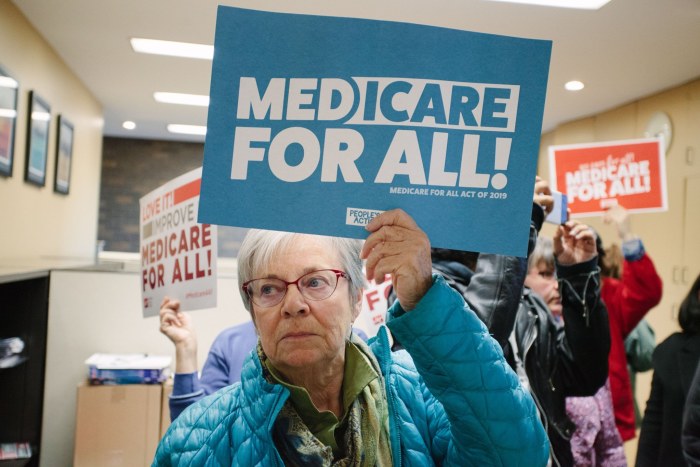Iowa State University economist Dave Swenson: Of three possible approaches to health policy, only Medicare for All “reduces the damage that the existing system causes and remedies the cumulative policy failures of the past 70 years.” -promoted by Laura Belin
Health care delivery in the U.S. is a market failure and a governmental failure.
The private sector cannot adequately supply all that is demanded because many of those seeking health care cannot pay for what they need. Government systems, while attentive to the needs of the elderly, disabled, poor, and many veterans, nonetheless fail to cover all who require health care, because policies and funding are inadequate.
As a consequence, too little health care is delivered. And too little health care is socially destructive.
The Patient Protection and Affordable Care Act of 2010 (the ACA, also known as Obamacare) was designed to and did significantly address health care access and affordability for millions. It created subsidies and devised options for a large swath of the U.S. population to purchase health insurance coverage on public exchanges. It expanded Medicaid. It created coverage mandates for businesses of certain sizes, and it eliminated free-riding by instituting tax penalties for persons who went uncovered.
Comprehensive health care reform via efforts to promote more private sector coverage, the creation and subsidization of Marketplace plans under the ACA, and expand public coverage with Medicaid have yielded important improvements in aggregate wellbeing. That’s undeniable. But the overall system is still socially inadequate: health care demands exceed available and affordable health care supplies.
Moreover, our complex system of private insurance providers, health care deliverers, and pharmaceutical firms generates unconscionable profits for some while gouging patients and payees for essential drugs and medical procedures. The system denies or severely rations needed services, creates navigational burdens for households and, in the aggregate, delivers health services at substantially higher costs per capita and to fewer recipients than our industrialized peer nations.
While getting less for more, our health outcomes are worsening compared to our western competitors.
Fixing it all is problematic. Comprehensive health policy change in the U.S. is inevitably preempted by the tax increase poison pill, which argues that needed reforms would burden households and stifle economic growth.
Yet most of us have no idea what our health care costs as a fraction of our total incomes, how much waste we endure personally or socially, and, importantly, what our health care ought to cost.
We presume, for example, that our employers pay for large portions of our health insurance. They don’t. Workers do. In essence, those so-called benefits are untaxed worker earnings that are diverted for health care coverage. They are considered part of our annual total personal incomes.
Those “employer-provided” insurance payments become the fees that we (not our employers) pay to belong to private health insurance risk pools. We add them to our additional premium costs plus our myriad out of pocket outlays to get the total cost of health care relative to our family incomes. That is how much we are currently contributing. And most families cannot tell you how much that is.
Would, for example, Senator Bernie Sanders’s and Senator Elizabeth Warren’s respective Medicare for All health care visions increase the sum of household current federal taxes plus private health care contributions? Analysis suggests that for the vast majority of households, they would not.
We further know that there are multiple categories of health service delivery that are over-priced in the U.S. compared to other industrial economies. Insulin is a notorious example. Furthermore, domestic prices vary widely, depending on whether they have been negotiated down by insurance companies and by federal providers.
And of course, health delivery in the U.S. requires layers of administrative structures at all levels that must process, verify, and ultimately approve claims or seek payment from customers.
Warren and Sanders both argue that Medicare for All will provide a comprehensive array of health care services for the same or a lower price per household than we are currently paying when all private payments and public payments are counted.
For both, health care becomes a universal entitlement to be funded substantially by boosted taxes on the wealthiest and by the whole of existing private and public outlays, significant portions of which are to be reallocated to health care delivery instead of unconscionable health system profits or for the purposes of administering a byzantine health delivery, financing, and bill collections structure.
It is the inevitable alignment of health policy and financial capacity with overarching national needs.
By so doing, some may be marginally worse off (especially the wealthiest), but millions will be massively better off.
Moving forward, I see three future health policy outcomes. In the first, nothing gets done. We pretend all is well or as well as it can be. Millions will remain underserved.
In another, policy incrementalists promote targeted scope and capacity fixes within the existing health delivery and policy superstructure.
This politically pragmatic view doesn’t rock the boat. It is as frightened of Medicare for All as much as it is beholding to the vast medical industrial complex, but it concedes that some fixes are needed.
Finally, one lays out a vision based on maximizing the social good that comprehensive health delivery reform will deliver and, at the same time, minimizing the harms the existing system causes.
It says, this is where we are going, and this is how we will get there. Climb on board or get out of the way.
It and it alone significantly reduces the damage that the existing system causes and remedies the cumulative policy failures of the past 70 years.
Top image: Photo by Karla Conrad from an Iowa CCI Action Fund rally for Bernie Sanders and Medicare for All in Des Moines on December 5.

